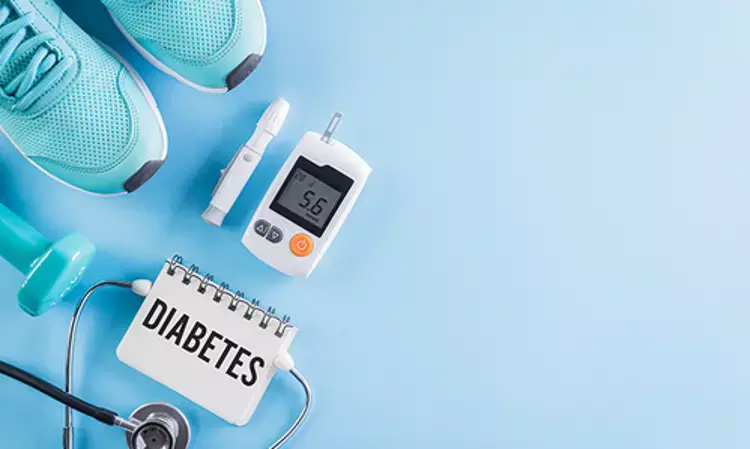- Home
- Medical news & Guidelines
- Anesthesiology
- Cardiology and CTVS
- Critical Care
- Dentistry
- Dermatology
- Diabetes and Endocrinology
- ENT
- Gastroenterology
- Medicine
- Nephrology
- Neurology
- Obstretics-Gynaecology
- Oncology
- Ophthalmology
- Orthopaedics
- Pediatrics-Neonatology
- Psychiatry
- Pulmonology
- Radiology
- Surgery
- Urology
- Laboratory Medicine
- Diet
- Nursing
- Paramedical
- Physiotherapy
- Health news
- Fact Check
- Bone Health Fact Check
- Brain Health Fact Check
- Cancer Related Fact Check
- Child Care Fact Check
- Dental and oral health fact check
- Diabetes and metabolic health fact check
- Diet and Nutrition Fact Check
- Eye and ENT Care Fact Check
- Fitness fact check
- Gut health fact check
- Heart health fact check
- Kidney health fact check
- Medical education fact check
- Men's health fact check
- Respiratory fact check
- Skin and hair care fact check
- Vaccine and Immunization fact check
- Women's health fact check
- AYUSH
- State News
- Andaman and Nicobar Islands
- Andhra Pradesh
- Arunachal Pradesh
- Assam
- Bihar
- Chandigarh
- Chattisgarh
- Dadra and Nagar Haveli
- Daman and Diu
- Delhi
- Goa
- Gujarat
- Haryana
- Himachal Pradesh
- Jammu & Kashmir
- Jharkhand
- Karnataka
- Kerala
- Ladakh
- Lakshadweep
- Madhya Pradesh
- Maharashtra
- Manipur
- Meghalaya
- Mizoram
- Nagaland
- Odisha
- Puducherry
- Punjab
- Rajasthan
- Sikkim
- Tamil Nadu
- Telangana
- Tripura
- Uttar Pradesh
- Uttrakhand
- West Bengal
- Medical Education
- Industry
A new diabetes subtype identified in Sub-Saharan Africa and Black Americans, study finds

An international team of researchers has made a key discovery: many children and young adults in Sub-Saharan Africa diagnosed with type 1 diabetes (T1D) may have a different form of the disease - one not caused by the immune system, unlike classic T1D. This discovery could change how diabetes is diagnosed, treated and managed across the region, paving the way for more accurate care and better outcomes.
The research was published today in Lancet Diabetes and Endocrinology.
“This is the first study across several Sub-Saharan African countries to use the same lab tests and genetic tools to learn more about type 1 diabetes. We've done similar research in the U.S. with different groups, but what's exciting here is being able to compare results between Africa and the U.S.,” said the paper’s co-author Dana Dabelea, MD, PhD, Distinguished Professor and Associate Dean of Research at the Colorado School of Public Health on the University of Colorado Anschutz Medical Campus.
The researchers enrolled 894 participants with youth-onset diabetes from three African countries: Cameroon, Uganda and South Africa. They compared findings from this population with similar studies done in the U.S. in the same age range.
“It’s a really unique and important opportunity to explore the heterogeneity of T1D across countries and racial groups living in vastly different environments," adds Dabelea, who is also the director of the Lifecourse Epidemiology of Adiposity and Diabetes (LEAD) Center at CU Anschutz.
The researchers found that many young people in Sub-Saharan Africa diagnosed with T1D often don't have the usual markers in their blood (called islet autoantibodies) typically seen in people with T1D in other parts of the world. Specifically, 65% of participants with T1D in this region did not have islet autoantibodies.
Islet autoantibodies help distinguish T1D from other forms of diabetes, like type 2 or monogenic diabetes, which have different causes and treatments.
“This suggests that many young people in this region have a different form of T1D altogether and is not autoimmune in origin,” said Dabelea.
When the researchers compared this data to studies in the U.S., they found a smaller but significant proportion (15%) of Black participants diagnosed with T1D had a similar form of diabetes found in Sub-Saharan Africa - characterized by negative autoantibodies and a low T1D genetic risk score.
However, white Americans with T1D showed the typical autoimmune pattern, even if they didn’t have detectable autoantibodies, their genetics still pointed to autoimmune diabetes.
“The identification of this T1D diabetes subtype in Sub-Saharan African populations and among individuals of African ancestry in the U.S. suggests a potential ancestral or genetic link,” Dabelea notes. “These findings highlight the need to consider alternative etiologies in this group and a deeper understanding of the underlying mechanisms may provide important insights for future prevention and treatment strategies.”
Reference:
Katte, Jean Claude et al. Non-autoimmune, insulin-deficient diabetes in children and young adults in Africa: evidence from the Young-Onset Diabetes in sub-Saharan Africa (YODA) cross-sectional study, The Lancet Diabetes & Endocrinology.
Dr Kamal Kant Kohli-MBBS, DTCD- a chest specialist with more than 30 years of practice and a flair for writing clinical articles, Dr Kamal Kant Kohli joined Medical Dialogues as a Chief Editor of Medical News. Besides writing articles, as an editor, he proofreads and verifies all the medical content published on Medical Dialogues including those coming from journals, studies,medical conferences,guidelines etc. Email: drkohli@medicaldialogues.in. Contact no. 011-43720751


